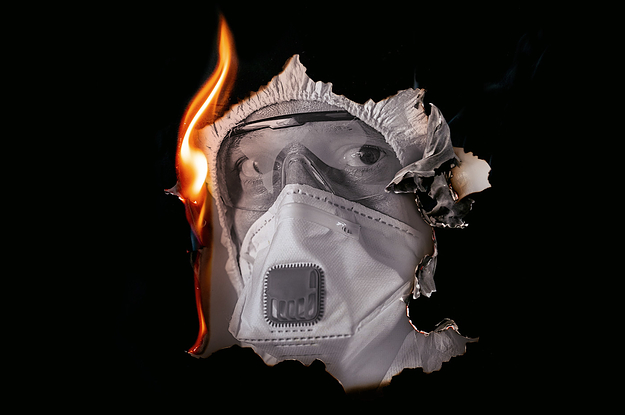Is a Mental-Health Crisis Looming?
In mid-April, as the coronavirus gripped New York City, Brian Lehrer of WNYC hosted a call-in segment for listeners who had struggled with addiction. Simone, from Brooklyn, who attended Narcotics Anonymous, told Lehrer that she was initially “skeptical” of Zoom meetings but that they were working well for her. Vilma, of the Bronx, said working from home gave her a sense of control over eating that she never had before. Three other callers were managing well, including Stuart, who was now getting extra methadone take-home bottles, because of COVID-19 accommodations, but felt no urge to drink more than one per day, as prescribed.
Judging from the show’s tagline, “For those of you struggling with addiction, mandated social isolation is particularly cruel,” the producers clearly expected something other than these upbeat testimonials. Some of my colleagues have a similarly grim, and similarly misplaced, view, predicting that a pandemic of mental illness will follow the coronavirus pandemic. A former surgeon general, Dr. David Satcher, has called for a “government taskforce on coronavirus-based trauma.” And a consortium of mental-health groups has requested a whopping $10 billion from Congress to address the impending “mental health and addiction crisis,” an amount almost twice the 2020 budget request of the federal Substance Abuse and Mental Health Services Administration (SAMHSA).
As a psychiatrist, I am skeptical that a national crisis of mental illness is looming. Researchers have long known that most people are resilient in the face of crisis and do not succumb to psychopathology. Vulnerable individuals are likely to be those who suffer a relapse of a preexisting mental-health disorder or who experience an exacerbation of current symptoms of depression or anxiety. The stimulus bill enacted at the end of March included $425 million for emergency mental-health and substance-abuse problems, suicide prevention, and community mental-health centers. In view of the chronic underfunding of our public mental-health-care system, the increased expenditure is welcome.
In an interesting historical footnote, psychiatrists have recorded cases of temporary psychosis among a subset of patients infected with the influenza virus. (President Woodrow Wilson suffered cognitive deterioration due to viral encephalitis from the Spanish flu.) In addition, researchers have observed a correlation between season of birth and the development of psychotic disorders, such as schizophrenia and bipolar illness later in life. These developments, of course, are biological in nature and unrelated to fear surrounding infectious outbreaks.
Still, there is — and will continue to be — a vast amount of psychic pain. A heavy pall of uncertainty is upon us. When will we feel safe from this brazen virus, when will a vaccine or treatments arrive, and will we see a resurgence of the virus after it has receded? Polls reveal that between 40 percent and more than half of Americans feel that corona-related stress is “hurting their mental health.” The Washington Post recently reported that, compared with last April, “texts to federal government mental health hotline [are] up roughly 1,000 percent.” Sales of alcohol and cannabis have spiked.
We need to think clearly about whose needs are best met by mental-health professionals and whose suffering should be “treated” in other ways.
Under lockdown, basic mental hygiene will suffice for most: Get out of your pajamas each morning, keep a routine, and get ample sleep and exercise. Also connect, connect, and (virtually) connect with family and friends, and help others do the same. A bracing dose of Stoic philosophy is also in order, to remind us that “life is what our thoughts make of it,” as Marcus Aurelius understood.
Some need more than good advice to endure the pandemic, however. Mandated isolation can be an anxiety-provoking trial. To soften or avert a “social recession,” as former surgeon general Vivek Murthy recently called it in The Atlantic, neighbors must engage with isolated elderly or disabled people and assure them that they matter and belong and that they won’t go without material reserves.
Also, workers and businesspeople are reeling from the economic devastation. More than 30 million people have filed for unemployment since the third week in March. A Pew poll conducted March 19–24 found, unsurprisingly, that people with lower incomes and those whose jobs or incomes have been cut are experiencing the highest levels of “psychological distress.” In a variety of contexts, economic crises, including the Great Depression of the 1930s and recessions, have been linked with an increase in suicide and depression.
The solution for the alienated and the financially unstable isn’t mental-health experts. It is neighbors, community, and money. When embattled, most people are sustained by their families and communities, and those need to remain upright. Careful and gradual commercial awakening is essential, but until desperate people can work, both they and the economy must be given money, along the lines of the stimulus package: payments to individuals, unemployment benefits, small-business support, and paycheck-protection aid.
This is a terrible time for many Americans. But the extent and depth of despair — and the power to contain it — depend less on the ministrations of therapists and psychiatrists and more on the rest of us. It depends on governments to keep the financial lifeblood circulating and on neighbors and communities to keep the civic fabric strong. The more we medicalize normal and temporary reactions to a crisis and outsource its management to professionals, the more we risk diluting the felt obligations of those sheltering institutions.
Individuals, too, have a responsibility. Hard as it may be, it helps when we shape our perception of adversity as a challenge to surmount and then make it a personal mission to do so.








Recent Comments